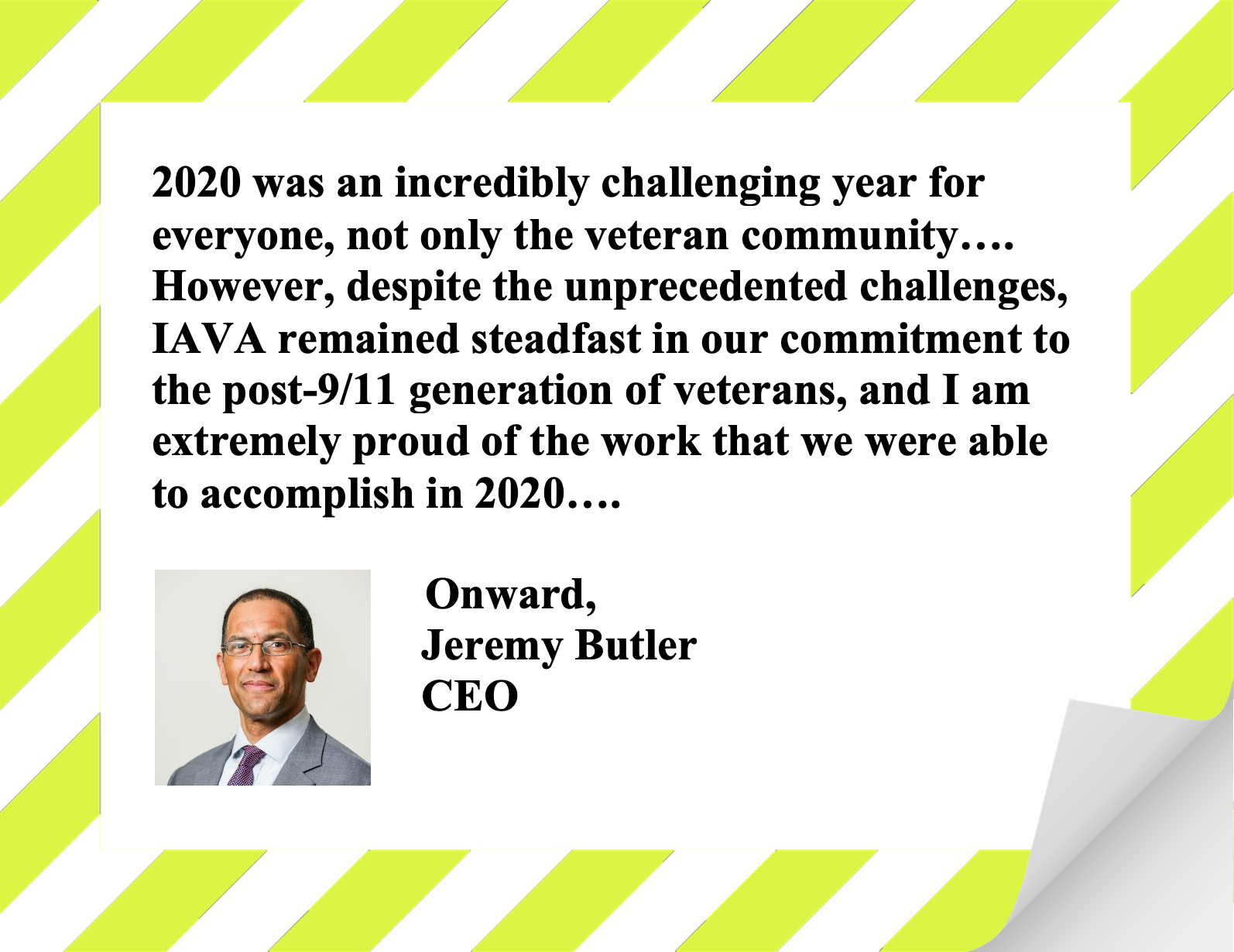IAVA's Policy Agenda for the 117th Congress
Combat Suicide among Troops and Veterans
Campaign to Combat Suicide among Troops and Veterans
For nearly a decade, IAVA and the veteran community have called for immediate action by our nation’s leaders to combat the crisis of 20 servicemembers and veterans dying every day from suicide. In the last two years, we made significant strides towards addressing this epidemic.
2020 was a groundbreaking year in mental health and suicide prevention. The passage of the IAVA-backed Commander John Scott Hannon Veterans Mental Health Care Improvement Act will result in critical reforms in how America combats the suicide crisis. Key provisions of this legislation will include the creation of a community grant program to help identify isolated veterans and provide mental health services, which is modeled after the extremely successful Supportive Services for Veteran Families (SSVF) program. These targeted programs are designed to identify the 14 veterans per day who die by suicide but are not currently participating in VA services and connect them to lifesaving resources. Additionally, this legislation will expand VA’s tele-health services at a time when veterans may be feeling more disconnected than ever before. These are critical improvements to VA care. But the work is not done.
According to the most recent VA data, the youngest cohort of veterans, post-9/11 veterans aged 18 to 34, have the highest rate of suicide. And while not always an indicator of suicide, mental health injuries continue to disproportionately impact the post-9/11 generation. In our latest member survey, a stunning 65% of IAVA members reported service-connected PTSD and over half reported anxiety (58%) or depression (56%). Meanwhile, the nation and VA struggle to keep up with the demand for mental health care and mental health care providers such as psychiatrists and psychologists, both of which are in the top 5 for VA staffing shortages.
Over the past few years, there has been much progress made in the realm of suicide prevention and mental health. The VA, DoD, and DHS’ plan for transitioning service members targets those in the post-9/11 generation at increased risk of suicide to engage with them before the moment of crisis. VA has leveraged tele-mental health care to expand its reach and predictive analytics to target the top 0.1% of veterans at risk for suicide. These reforms are critical to addressing the suicide crisis and IAVA remains dedicated to combating suicide.
IAVA's Approach
Mental Health and Suicide Prevention Support for Military Families
Mental Health and Suicide Prevention Support for Military Families
It is true that the family serves alongside the service member. Military families are the support system for American service members and often face the same challenges service members do, whether it is a lack of community support, living far away from family and friends, relying on DoD services, or adjusting to deployments and months or years away from their service member. According to Blue Star Families’ most recent survey, over 39% of the military families surveyed had experienced six months or more of separation from their service member in the past 18 months.
However, military families often lack the same support system and services of their service members. And while DoD has invested resources in supporting military families, such as Military One Source modules and tracking of military spouse suicides, there is still work to be done. In fact, over 50% of Blue Star Families respondents to their 2018 survey did not feel DoD provides adequate support services for their children to deal with the unique challenges associated with deployments. And when asked how to best improve mental health care to military families, Blue Star Families found that ensuring alternative and complementary treatments, such as chiropractic care and acupuncture, was a top priority.
IAVA's Recommendations
- Conduct a joint DoD/VA study of secondary PTSD and its impact on military spouses and children
- Require DoD to publish and report the number of military family member suicides every quarter with DoD’s Quarterly Suicide Report
- Provide incentives for mental health providers to specialize in supporting children in military families and support research and programs to further understand the health challenges confronting military families
- Ensure full coverage of alternative treatments and therapies for military dependents
- Continued expansion of family access to mental health counseling through programs such as Military Family Life Consultants and Military OneSource
- Support efforts to engage, support, and train family and friends in prevention and postvention strategies following the work of organizations such as Tragedy Assistance Program for Survivors, Tuesday’s Children, and American Society of Suicidology
IAVA's Policy Priorities
Select a topic from the list below to learn about IAVA’s policy recommendations for the 117th Congress.

